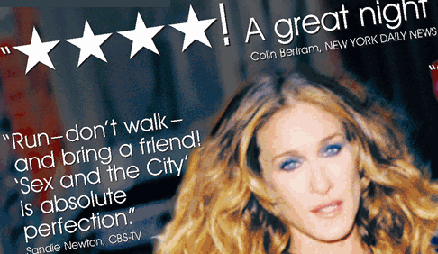WEBLOG
Previous Month | RSS/XML | Current | Next Month

May 30th, 2008 (Permalink)
Blurb Watch: Sex and the City
An ad for the new Sex and the City movie uses the four-star trick, that is, it quotes the New York Daily News critic giving the movie four stars, which is true except that the ad leaves out the fact that it is out of five stars possible. So, the review isn't the rave that the adwriter wants you to believe it is.
I've noticed that some other movie ads are now noting in parentheses the total number of stars possible, though only when the movie being advertised received the full complement. For instance, the ad for the new movie Standard Operating Procedure shows four stars―followed by the traditional inserted exclamation point―then in parentheses and small print says: "highest rating".
This development suggests the following rule of thumb: if a movie ad quotes a critic's star rating without noting the number of stars possible, then that number is greater than what the movie received. So, a four-star movie without such a note is, at best, a four-out-of-five star movie, as is Sex and the City.
Sources:
- "Ad for Sex and the City", Dallas Morning News, 5/30/2008
- "Ad for Standard Operating Procedure", Dallas Morning News, 5/26/2008
- Colin Bertram, "'Sex And The City: The Movie' proves that a great reunion is possible", Daily News, 5/5/2008
Resource: "Blurb Watch: The Year My Parents Went on Vacation", 4/11/2008
May 29th, 2008 (Permalink)
The Back of the Envelope
The Numbers Guy has another quiz, this one based on the new book, Guesstimation: Solving the World’s Problems on the Back of a Cocktail Napkin by Lawrence Weinstein and John A. Adam. The title refers to its topic, which is also called a "back of the envelope" calculation. The ability to make such ballpark estimates is very useful for checking the plausibility of statistical claims.
Here's an old puzzle of mine that is similar to Bialik's first quiz question: What city in the contiguous United States is roomy enough in area that the entire population of the planet could stand inside its city limits? A back-of-the-envelope calculation probably won't help you to solve it unless you also know a surprising bit of trivia. (See the first Resource below for the answer.)
Source: Carl Bialik, "Numbers Guy Quiz: Guesstimation", The Numbers Guy, 5/28/2008
Resources:
- May I Puzzle You?, 5/20/2005
- Caveat Lector, 6/25/2007
May 27th, 2008 (Permalink)
Altered States
Jake Camp suggests a new fallacy:
My wife and I recently had a philosophical discussion in which I was espousing my position on something. Earlier in the night, I had consumed a bit of alcohol. She proceeded to discredit my argument on the basis that I was drunk. I, then, accused her of committing a fallacy of relevance, the drunken man fallacy, which a colleague of mine noted could also be called an ad hominem-alcoholic. More generally, the fallacy is a species of what I call ad hominem-altered states arguments.As with other fallacies of relevance, the ad hominem-altered states fallacy obtains when the arguer puts forward a set of premises that is logically irrelevant to the conclusion. The intent is to discredit an opponent's position on the basis of features about the person's character, interests or the like. The essence of this particular fallacy is that a person may be under the influence of a certain drug, yet still produce a sound or cogent argument. Although the ad hominem-altered states fallacy is perhaps most closely related to the ad hominem-circumstantial, it is a distinct kind of argument against the person. Thus, while ad hominem-circumstantial arguments attempt to undermine an opponent's position on the basis of features about the arguer's intent or overall interests, ad hominem-altered states arguments (and drunken man arguments specifically) merely take note of the intoxicated state of the arguer and suggest that such a state is not compatible with the production of good arguments.
I agree with Jake with a few reservations:
- I'm not sure whether this type of argument is common enough to warrant considering a distinct form of ad hominem-circumstantial. Outside of Jake's anecdote, I don't know of any other examples, and it's a bad idea to rely exclusively on anecdotal evidence.
- If it really is common enough to merit being considered a fallacy, then ad hominem-altered states is a subfallacy of ad hominem-circumstantial. Jake seems to be arguing in his second paragraph that the altered states fallacy is separate from, as opposed to a type of, ad hominem-circumstantial. However, being in an altered state is the "circumstance" of the arguer that is used to attack the argument, and this fits the definition of "ad hominem-circumstantial".
- It's worth pointing out in connection with this possible fallacy, as well as with ad hominems in general, the distinction between argument and testimony. Ad hominem criticisms can be relevant and non-fallacious when directed at testimony, but are irrelevant and fallacious when aimed at argument. For instance, the fact that a person is drunk might be a reasonable basis for doubting or dismissing their testimony, but it is not a good reason to do so to their arguments. This is because arguments can stand or fall on their own merits, and we are not called upon to take the arguer's word. Of course, the fact that someone is drugged might explain why they reason fallaciously, but the fact that they do so is independent of their state of mind. In contrast, the evidential value of testimony depends upon the trustworthiness of the witness, and a person under the influence of drugs may be an untrustworthy witness.
May 22nd, 2008 (Permalink)
"Every" Versus "Only"
Eugene Volokh has another interesting post on a logical issue in a legal decision. The constitution of New Hampshire has the following clause:
…[E]very inhabitant of the state of 18 years of age and upwards shall have an equal right to vote in any election.
The New Hampshire supreme court has interpreted this clause to mean that all and only those inhabitants at least 18 years old have the right to vote. So, a law allowing 17-year-olds to vote in primaries if they will be 18 when the general election is held is unconstitutional, according to the court.
"Only" is a logically interesting word: it tends to reverse the direction of conditional propositions. Consider the following sentence:
The light will shine if you raise switch A.
Using an arrow to show the direction of the conditional relationship, this means:
You raise switch A → the light will shine.
This means that if it's true that you raised switch A, then it's true that the light shines. In other words, raising switch A is a sufficient condition for the light to shine. However, this does not rule out that there might be other ways to make the light shine; for instance, the light might be on a circuit with two switches, either of which will turn it on. So, the following would also be true:
The light will shine if you raise switch B.
Now, compare the following sentence:
The light will shine only if you raise switch A.
This means that if it's true that the light is shining then you must have raised switch A. Or, using the arrow to show direction:
The lights shines → you raised switch A.
Note that the addition of the word "only" has reversed the direction of the conditional relationship, so that what was a sufficient condition is now a necessary condition. This new sentence leaves it open that there might be further necessary conditions for turning on the light; for instance, the light might be part of a circuit that requires both switches A and B to be raised. So, the following sentence would also be true:
The light will shine only if you raise switch B.
"Only" has a similar effect on universal generalizations. Consider:
I love all cats.
This means the same as: I love a thing if it's a cat. However, I might be an indiscriminate pet-lover and love all dogs as well. Contrast that with:
I love only cats.
Which means: I love a thing only if it's a cat. Now, I definitely don't like dogs, and I might not care for all cats, either. I might love only Cheshire cats. Once again, the word "only" has changed the direction of a conditional relationship.
In some contexts, the other direction of the conditional relationship may be implicit, so that an "if" has the effect of an "if and only if". For instance, this is common mathematical practice when one direction of the biconditional relationship is obvious. Similarly, an "all" may have the effect of an "all and only".
In this case, it appears that either the New Hampshire supreme court erred in its reading of the constitution, or the drafters of the constitution erred in writing it. If the writers of the constitution intended to set a minimum age for voting, they could have easily added an "only" to the clause. I'll leave it to the law professors to decide who was at fault.
Source: Eugene Volokh, "'Every X Shall Have' = 'Only X's Shall Have'?", The Volokh Conspiracy, 5/22/2008

May 21st, 2008 (Permalink)
Springtime for Hitler Cards
In Slate, Anne Applebaum criticizes some recent political rhetoric:
Unfortunately, Nazi analogies are nowadays usually deployed in order to end arguments, not to broaden them. Once you inject "Hitler" or "the Third Reich" into a debate, you have evoked the ultimate form of evil, put your opponent in an indefensible position―"What, you're opposed to a war against Hitler?"―and for all practical purposes halted the conversation.
Check it out.
Source: Anne Applebaum, "Leave Hitler Out of It", Slate, 5/19/2008
Acknowledgment: The picture is of Gary Beach in "The Producers".

May 18th, 2008 (Permalink)
Logic Puzzle: Who Stole the Tarts?
Someone has stolen the Queen of Heart's tarts. On the witness stand, Alice swore that she saw one and only one person take the tarts, but she couldn't identify the thief. When questioned, Bill said: "Dodo isn't innocent!" Under oath, the Cook testified that she had seen Elsie take the tarts. When called to the stand, Dodo shouted: "I didn't do it, I tell you!" Finally, Elsie insisted that Alice was innocent. All but one of the witnesses told the truth.
Who stole the tarts?

May 17th, 2008 (Permalink)
Silly Celebrity: Ben Stein
"When we just saw that man…talking about how great scientists were, I was thinking to myself the last time any of my relatives saw scientists telling them what to do they were telling them to go to the showers to get gassed…that was horrifying beyond words, and that’s where science―in my opinion, this is just an opinion―that’s where science leads you. …Love of God and compassion and empathy leads you to a very glorious place, and science leads you to killing people."
In addition to being an actor, game show host, and commercial pitchman for eye drops, Ben Stein is a lawyer. I assume, therefore, that he is an intelligent man. However, he is obviously in way over his head when it comes to science. Perhaps, as many intelligent people do, he overestimates his own knowledge.
I haven't seen his new creationist documentary Expelled: No Intelligence Allowed, but the "Leader's Guide" that was produced to accompany the movie is scientifically illiterate:
If the earth’s orbit were elliptical―like most other planets―rather than circular, or if it were just a bit closer or farther away from the sun, its temperature would not stay in the very narrow range required for lifesupporting chemical processes to function.
Apparently, the authors of this guide have never heard of Kepler or his first law. Do I have to mention that the orbit of the Earth is an ellipse just like any other planet? I like the fact that they say "most" other planets have elliptical orbits, as though they think that the Earth may not be the only one to violate natural law!
This howler is a premiss of an argument to the effect that the Earth is such a special place that it must have been designed for the benefit of life. Next thing you know, they'll be telling us that the Earth is the center of the universe!
Even if this premiss were true, it would still be a bad argument. The orbit of Venus is closer to the Sun than Earth's, and that of Mars is farther away, and there's no life on either planet as far as we know. So what? Life only develops on planets that can support life: that's no miracle. What would be miraculous is if life developed on a planet that couldn't support life! That might be some evidence for an "intelligent designer".
This is only one of many examples of scientific illiteracy in the "Leader's Guide" for the movie, though perhaps it's the most egregious. Apparently, the guide is intended to be used by teachers. Do we want people who don't understand basic scientific facts, or who are as anti-science as Stein, teaching science in our schools?
Sources:
- "Paul Crouch interviews Expelled's Ben Stein, part 5", YouTube, 5/7/2008
- "Expelled Leader's Guide" (PDF)
- Robert M. Hazen & James Trefil, Science Matters: Achieving Scientific Literacy (1991), p. 11.
May 12th, 2008 (Permalink)
Fallacy Files Book Club: Nudge, Introduction
In this installment of the Book Club, we'll be reading Richard Thaler and Cass Sunstein's new book Nudge. I haven't found any excerpts from the book online, so if you want to read along you'll have to find your own paper copy. This book should be of interest to Fallacy Files readers because its goal is to apply what has been learned about cognitive heuristics and biases to public policy. What effect, if any, should an understanding of human irrationality have upon politics? This is the first book that I know of that attempts to find an answer.
Thaler and Sunstein (T&S) start the book with the example of a school cafeteria (pp. 1-3): The way that a cafeteria is set up can influence what the kids choose to eat. Foods that are easier to see or reach than others will be chosen more than they otherwise would be. So, the designers of school cafeterias can affect the choices of their students based on various criteria. The criteria that T&S list are the following (p. 2):
- Maximize the overall best interests of the child.
- Randomize the arrangement.
- Place the most popular items in positions where they will be most accessible, thus minimizing the child's effort.
- Let suppliers bid, with the most prominent places going to the highest bidders.
- The capitalist choice, namely, maximize profit.
These kind of design decisions are what T&S call "nudges", because they take advantage of some characteristic of people―such as laziness―to gently push them into making a particular choice. An important point about the cafeteria example is that there is no nudgeless way to design a cafeteria, so that the design will inevitably steer kids to make certain choices. T&S recommend approach 1, which they call "libertarian paternalism": it's libertarian because it relies on free choice, but it's paternalistic in that it nudges that choice in the direction of the kids' best interests.
Here are a few questions that occur to me:
- So far, T&S haven't said anything about what's called "debiasing" in the literature on the subject of cognitive biases. Debiasing is the attempt to find ways to overcome or work around a bias. A nudge, in contrast, appears to be an attempt not to overcome a bias but to exploit it.
Applied to the cafeteria example, libertarian paternalism would attempt to nudge the students into choosing nutritious over junk food by exploiting their cognitive biases. In contrast, the debiasing alternative would attempt to educate the students so that nudges would be as ineffective as possible, thus allowing them to make rational decisions about what to eat.
T&S claim that opposition to libertarian paternalism rests upon the misconception that it is possible to avoid nudging people's choices (p. 10). Perhaps so, but isn't it possible to at least lessen people's tendency to be nudged? If so, then it would seem that the "misconception" itself rests upon a misconception, or at least a mistake about cognitive biases. The fact that human beings have biases doesn't imply that they are "hardwired" in us so that we can't compensate for them. Perhaps we can't, but that is something that T&S need to argue for, and so far they haven't done so.
- The above question raises another about the appropriateness of the cafeteria example: no doubt in designing a cafeteria one can't help but make it easier to choose some foods over others, so that it would seem that designing a cafeteria in a paternalistic way is the right thing to do. However, how strong an analogy is a cafeteria for the kind of choices that T&S are interested in? After all, they're not writing a book on cafeteria design. If the kind of situations that T&S wish to apply their brand of paternalism to are ones which can be debiased, then a debiasing strategy might be preferable to any type of paternalism.
A problem with paternalism of any sort is that it involves acting in loco parentis for others, treating them as if they are children. Of course, there's nothing wrong with treating children as children, but adults often resent such treatment. This is another way in which the school cafeteria analogy may be weak: one might agree that it is appropriate to treat schoolchildren paternalistically, but wrong to treat adults so, and it seems likely that many of the policies that T&S support will be aimed at adults.
- T&S draw a distinction between "Econs" and Humans:
If you look at economics textbooks, you will learn that homo economicus can think like Albert Einstein, store as much memory as IBM's Big Blue, and exercise the willpower of Mahatma Gandhi. Really. But the folks that we know are not like that. Real people have trouble with long division if they don't have a calculator, sometimes forget their spouse's birthday, and have a hangover on New Year's Day. They are not homo economicus; they are homo sapiens. To keep our Latin usage to a minimum, we will hereafter refer to these imaginary and real species as Econs and Humans. (pp. 6-7)
I'm not an economist, but this sounds like a caricature of economics, that is, a straw man. Perhaps economists of the past have underestimated the degree to which human irrationality may undermine the efficiency of free markets, but is it really possible that economists have been as deluded as this passage suggests?
Of course, so far this is just the introduction and these are only questions. Hopefully, these questions will be answered in the remainder of the book, but I raise them now because I want to be on the lookout for those answers.
Resource: Nudges. The official website for the book, it links to some reviews and other articles, a glossary, and of course the de rigueur "blog".
Update, 3/22/2023: The official website seems to no longer exist. Thanks to Alfred for pointing out the broken link.
Next Installment: Chapter 1
May 8th, 2008 (Permalink)
Headline
Great tits cope well with warming
May 7th, 2008 (Permalink)
New Book: Media Argumentation
I have a review of Douglas Walton's new book Media Argumentation in Notre Dame Philosophical Reviews (NDPR). Walton is an important and prolific writer on argumentation, logical fallacies, and related subjects. He is so prolific that he already has four books out since this one, which was published just last year!
NDPR is an online journal attempting to provide timely reviews of most scholarly books in philosophy, which is quite a task. It's a good use of an online journal, since it would be an even more difficult task to accomplish for a paper one. Check it out.
Source: Gary Curtis, "Review of Media Argumentation", Notre Dame Philosophical Reviews, 5/8/2008
May 6th, 2008 (Permalink)
Q&A
Q: I have seen some of the coverage of the campaigning in the news. One thing I found amusing was the coverage of the candidates trying to be "regular Joes". Because Hillary Clinton can chug down beers and knock down shots of liquor is she somehow "just like us"? Because Barack Obama goes bowling with his buddies should he be considered "just one of the guys"? I don't know, can these be considered logical fallacies?―Wilmara M. Pujols
A: This is a familiar ploy that is sometimes called "plain folks". Psychologists who study persuasion have found that how much you like the persuader has a strong effect, since it's harder to turn down a friend or someone you like than it is a stranger or someone that you don't like. For this reason, salespeople may try to befriend you before trying to sell you something. Furthermore, people tend to like people who are like themselves: "birds of a feather flock together".
Politicians are also trying to "sell" you something, namely, themselves. They want to convince you to vote for them, and you are more likely to do that if you like them; and you are more likely to like them if they are like you. So, politicians have traditionally tried to convince voters that they are "Joe Six-packs" like the majority of voters, and not "elitists". Of course, anyone who becomes a serious candidate for president is thereby part of a small elite.
It's not unreasonable to prefer to vote for someone who, if not like yourself, at least understands your problems. The fault of the "plain folks" ploy is not in the reasoning, but in the transparently false premisses. For instance, one learns from accounts of one of Hillary Clinton's own photo-op stunts that she hasn't driven a car or pumped her own gas in years. For this reason, "plain folks" isn't a logical fallacy but a propaganda technique.
Sources:
- "Play of the Day: Clinton Visits Gas Station for Cameras", Associated Press, 4/30/2008
- Robert Cialdini, Influence: The Psychology of Persuasion, Revised Edition (1993), Chapter 5 and pages 173-174, especially.
- Alfred McClung Lee & Elizabeth Briant Lee, The Fine Art of Propaganda (1939), Chapter 8.
- Alfred McClung Lee, How to Understand Propaganda (1952), pp. 70-71.
May 3rd, 2008 (Permalink)
What's New?
I've added a new book to The Fallacy Files Bookshelf.
Resource: Book Review: Damned Lies and Statistics, The Fallacy Files Bookshelf
Who Stole the Tarts: Elsie. Here's one way to solve this type of puzzle: Bill's testimony is logically equivalent to: "Dodo is guilty", but Dodo denies guilt. So, Bill and Dodo contradict one another, which means that what one testified is true and the other is false. Since we know that only one of the suspects lied, the other three must be telling the truth. So, Alice was telling the truth when she testified that only one person took the tarts, and the Cook swore truthfully that it was Elsie. Since only one person stole the tarts, Bill was lying when he claimed that Dodo was guilty, and all the other witnesses told the truth.